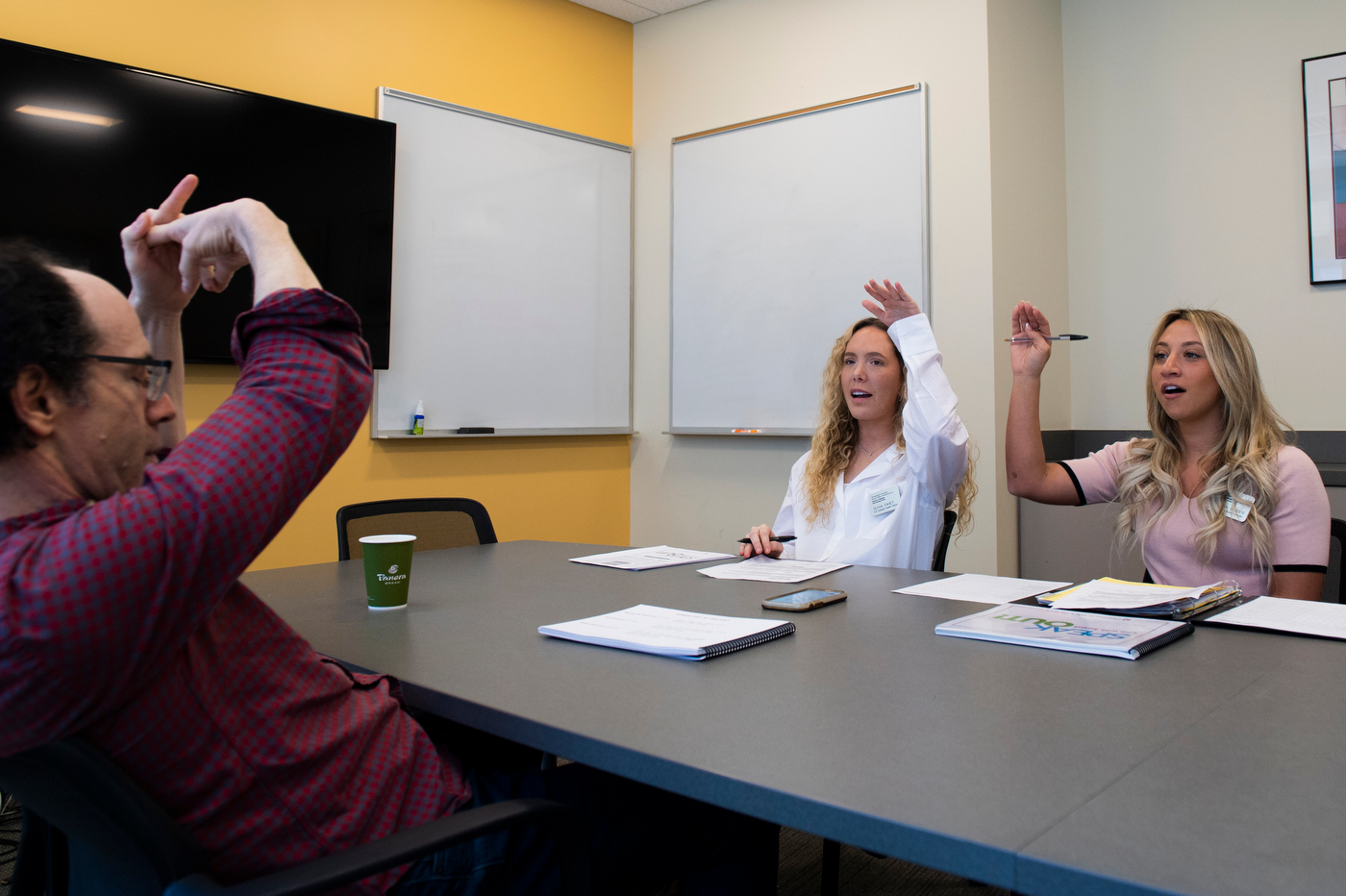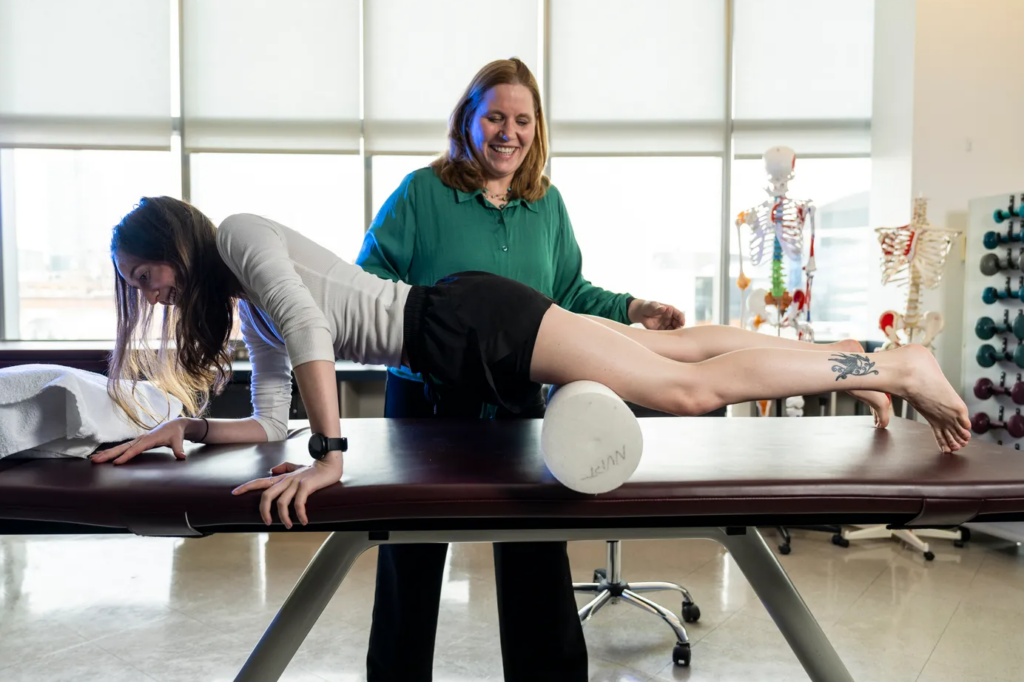Rob Jacobson practiced saying “ah.” A sustained note, the vowel sounded loud and clear, filling up the room where two graduate students led him through a series of vocal exercises.
Next up: three ascending tones and three descending tones. Again, they were strong, distinct pitches.
Jacobson, 49, looked pleased. So did Sabrina Bender and Olivia Fahey, both graduate students in Northeastern’s Speech-Language Pathology program. More than just a means for clear communication, Jacobson’s strong voice represented a triumph in speech therapy. He’s the first graduate of a specialized, therapeutic program at the university for people with Parkinson’s disease.
“It’s been really helpful,” said Jacobson, who’s been living with Parkinson’s for more than 15 years. “I’m aware that my voice can change over time” as a result of the degenerative disease, he said. “But my friends tell me they can understand me much better now.”
Indeed, research shows that 70% to 80% of people with Parkinson’s disease—a disorder of the central nervous system that affects movement—experience changes in their voices that are noticeable to others. More than half (55%) of people with Parkinson’s experience changes in their articulation, as well.
Previous story: Speaking with intent in Parkinson’s disease: Northeastern’s Speech Language Hearing Center receives grant
But these changes can be postponed or mediated with early therapeutic intervention, said Elizabeth Martin, assistant clinical professor at Northeastern.
Enter: SPEAK OUT!, a therapy program in the university’s Speech-Language and Hearing Center specifically designed to give people with Parkinson’s strategies to compensate for the decline in their communication skills.
During the four-week program run by Martin, participants learn to speak with intent—a subtle shift that can help them overcome neurological challenges associated with Parkinson’s.
"What I love about working with people with Parkinson’s is that they get an immediate change from this program."
The disease causes certain nerve cells to break down over time, Martin explained. Among them are neurons that produce dopamine, an important chemical messenger in your brain. While dopamine is most commonly associated with its function as a “feel-good” hormone, it also plays a key role as a neurotransmitter, communicating messages between nerve cells in your brain and the rest of your body. Crucially for people with Parkinson’s disease, dopamine is involved in movement, and the loss of it over time makes it harder for people with the disorder to control and coordinate their movements, Martin said.
“That chemical imbalance leads to physical symptoms associated with Parkinson’s, such as slowness of movements, tremors, and rigidity,” she said. These symptoms also affect people’s vocal cords, and as a result, their speech intelligibility. Some people experience a soft or monotone voice, imprecise articulation, or changes in vocal quality, Martin said.
Importantly, research shows that the disorder affects people’s “motor automaticity,” or the ability to perform movements without specifically focusing on them, particularly movements that don’t require much precision, or movements that we make over and over again. Lots of daily behaviors, such as brushing your teeth, eating with a fork or a spoon, walking, or talking, are automatic motor skills for many people.
Martin, along with Bender and Fahey, however, teach people with Parkinson’s to “speak with intent,” Martin said, a deliberate, conscious way of using one’s voice that capitalizes on the body’s non-automatic motor system as a kind of work-around.
To understand the difference, consider an example: Walking from one side of the room to another. As you walk, maybe you’re thinking about what’s on the other side of the room, or even what’s for dinner later on. Now consider that you have to walk the same path, taking the biggest steps you can. What are you thinking about? The big steps you’re taking. Martin and the other SPEAK OUT! instructors teach people with Parkinson’s the vocal equivalent of taking big steps.
Martin and her students lead participants through a series of six vocal exercises that facilitate deliberate intention, including a sustained “ah” sound, gliding through a series of pitches, counting up to 20, reading printed passages, and other cognitive tasks. During a session with Jacobson, for example, Bender and Fahey asked a series of questions about what one might find at a zoo. Such questions challenge participants to consider their answers and then articulate them deliberately.
After the four-week program, participants start group treatment and join what’s called the “LOUD Crowd” to maintain their skills. LOUD Crowd meets once per week, and offers a community support component as well as skills maintenance.
The program, which started at Northeastern in the fall of 2021, now boasts four graduates and four additional LOUD Crowd participants who completed the individual therapy elsewhere, Martin said. The program just received its third round of funding from the Texas-based Parkinson Voice Project to continue for the upcoming year, and three more people are already enrolled for the summer.
For students such as Bender and Fahey, who receive intensive training in the therapeutic protocol, following participants through the program can be a rewarding experience.
“Rob was the first client I ever worked with,” Fahey said. “Seeing his progress—and working with him to achieve that progress—has been really exciting.”
Fahey, Bender, and Martin just hope more people join the free program, which is also part of a research study to investigate the many ways it can benefit people with Parkinson’s.
As of 2017, Parkinson’s affected 1 million people in the U.S., a figure that is estimated to grow to 1.6 million by 2037, according to a study published in the National Library of Medicine.
“The earlier you intervene with a therapeutic program, the more likely you are to have a good outcome,” Martin said.
She’s witnessed those outcomes firsthand.
“What I love about working with people with Parkinson’s is that they get an immediate change from this program,” she said. “They get to hear themselves improve in their communication skills and it gives them a new sense of confidence when people can understand them. We can teach these tools that they can use in their daily lives, and that drastically improve their quality of life. I love seeing how quickly that happens, and I love watching my students see that improvement, too.”
To participate in SPEAK OUT! and the LOUD Crowd, please contact Martin at the Speech-Language and Hearing Center, 617-373-6891, or by email at [email protected]. All sessions take place in the Behrakis Health Sciences Center on Northeastern’s Boston campus, or online via Zoom.
This post was originally published on News @ Northeastern by Molly Callahan.




